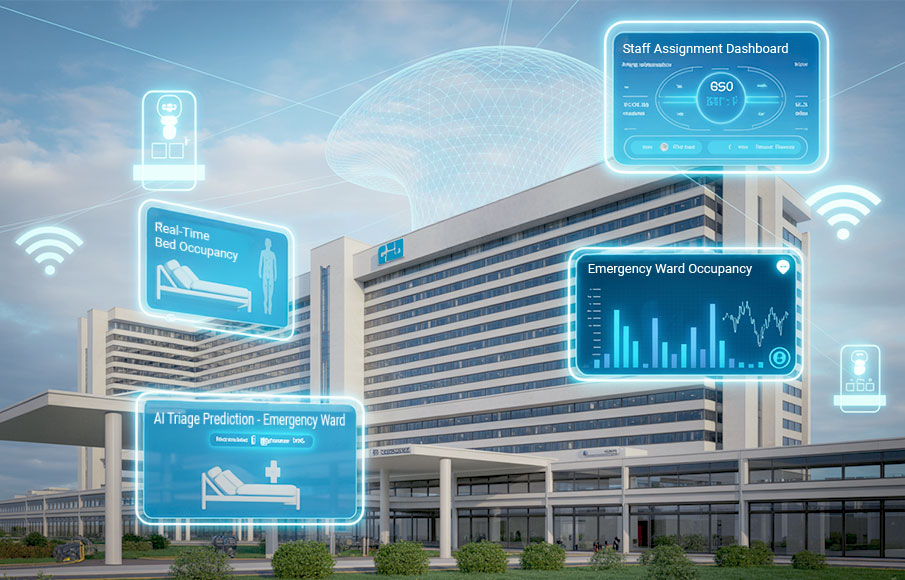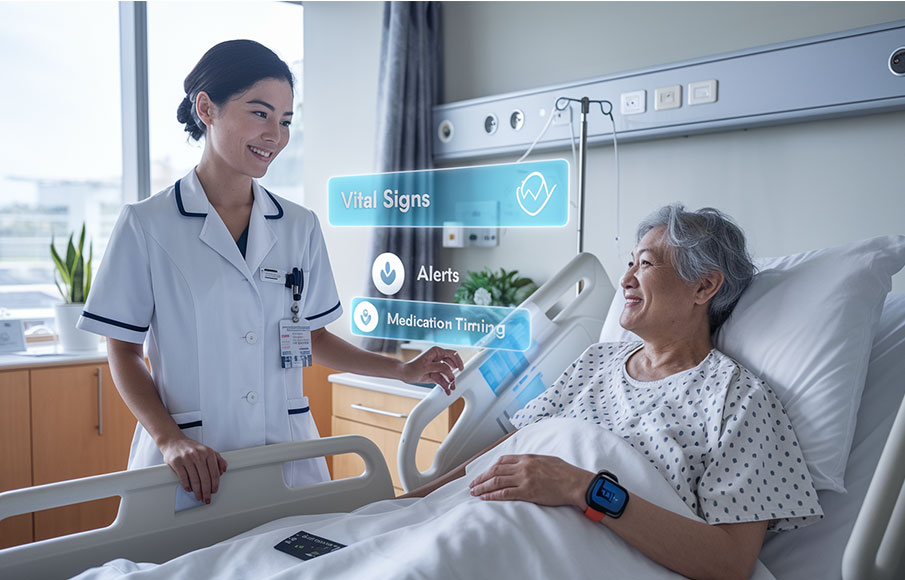Healthcare Digitisation Technologies in Singapore (2025)
- 15 July 2025

In recent years, the Singapore healthcare sector has been actively seeking improvement through the use of digital technologies, in order to enhance care delivery and efficiency for patients. From artificial intelligence applications in hospitals to the digitisation of medical records, to accessibility improvements in clinical trials, healthcare providers are leveraging digital tools to improve outcomes, reduce manpower burdens, and manage resources effectively.
The use of these digital tools and systems to improve healthcare delivery is known as Healthcare Digitisation, and is an ongoing initiative intended to support better outcomes for patients and providers.
Key Trends in Singapore Healthcare Technology
Across the healthcare industry, hospitals and providers are leveraging cutting-edge solutions to improve patient interactions, data management, and staff workflows. Some of these technology trends include:
Electronic Health Records & Big Data Sharing
By securely storing a patient’s medical history electronically, information can be accessed across different facilities. Hospitals are able to streamline processes and improve continuity of care thanks to unified access to vital medical records.
The usage of Big Data allows doctors to aggregate large amounts of information on patients, providing up-to-date insights that help them identify symptoms early, as well as provide more accurate diagnoses. This access to information leads to improved decision-making, and thus to better patient outcomes.
Wearable Technology
Wearable and smart devices are making healthcare delivery more efficient. For instance, connected monitoring systems can track patient vitals in real time, reduce manual data entry, and support faster responses.
Hospitals are also using Smart Wards to incorporate automation and tracking technologies, enabling institutions to respond more efficiently to care needs and optimise available resources. These advancements are changing how hospitals operate, aiming to maintain high standards of care even with tighter manpower.
Predictive AI & Automation
Artificial intelligence is increasingly used for diagnostics and predictive analytics. By accessing a patient’s records, these AI algorithms are able to determine their risk factor for acute and chronic diseases with a high level of accuracy. These insights help clinicians make faster, more accurate decisions and enables early intervention for patients.
On top of diagnoses, this AI can be utilised for automation. This streamlines processes and reduces manual tasks, helping staff focus more on patient care. Technologies like sensors, automation, and data-driven platforms assist in managing healthcare operations more efficiently.
One example of usage is the Singapore Heart Lesion Analyser (Sense), that is being trialed at the National Heart Centre Singapore (NHCS), NUH, and Tan Tock Seng Hospital later in 2025. By making use of complex algorithms, it is able to interpret cardiac imaging scans and evaluate the risk of coronary artery disease in far less time than a radiographer and cardiologist would normally take, enabling faster and more accurate diagnoses.

This continual focus of these key trends is to prepare Singapore’s healthcare system for more efficient and accessible care. These systems are primarily designed to help healthcare professionals manage their workload effectively, making it possible to deliver a high quality of care while reducing the impact of manpower shortages.
3 Areas SPTel Technologies CAN support Healthcare Digitisation

SPTel can help Healthcare providers spearhead their digitisation efforts, by providing ICT solutions that help them achieve faster and more responsive connectivity, stronger data protection measures, and efficient management of assets such as medical devices. These solutions can play a significant role in transforming daily operations and improving patient care.
Managed Security Solutions
When engaging in Electronic Health Record-keeping & Big Data Sharing, robust security is of the utmost priority. Medical professionals need to be able to safeguard patient data and ensure that this sensitive information is well-protected by their database. In addition, the digital infrastructure that these hospitals operate on need to be safeguarded against cyberattacks such as denial-of-service attacks that can cripple operations.
Here is how SPTel can help protect medical data through our Managed Security Solutions.
Managed Firewall: SPTel’s Managed Firewall service provides a multi-layered defence mechanism at all network entry points. This service protects against cyber threats with best-in-class threat intelligence. The firewall system is integrated into SPTel’s fibre network, offering a robust and reliable security solution for healthcare providers that prevents unauthorised access to vital information.
Managed Web Application Firewall: To protect web applications that handle patient data and healthcare services, SPTel’s Managed Web Application Firewall offers comprehensive threat protection, which makes use of Machine Learning and Behavioural Analysis to constantly keep you apprised of threats. It is deployed using a virtualised ‘as-a-Service’ method, and features a security event dashboard for ease of access.
Managed DDoS Protection: Healthcare services must remain accessible at all times. SPTel’s Managed DDoS Protection service provides real-time detection and mitigation of Distributed Denial-of-Service (DDoS) attacks, ensuring that cyber threats do not take down critical systems. Unlike other security providers, that might require days to activate DDoS protection, our Mitigation on Demand (MoD) service can be activated in just minutes. This service includes proactive monitoring and advisories, and functions on a pay-as-you-use model.
Managed Quantum Key Distribution (QKD): The rise of quantum computers will render current encryption technologies obsolete. This is where Quantum Key Distribution, or QKD, will play a crucial role for those in healthcare looking to safeguard their data integrity. Today, SPTel and SpeQtral have been appointed to build Singapore’s quantum-secure communications network as part of IMDA’s NQSN+ initiative. We have successfully developed a resilient and secure Quantum- Safe network leveraging on our trusted Quantum safe nodes for the nation.
Our managed QKD solution enables the healthcare sector to integrate QKD enabled solutions seamlessly with existing infrastructure, future-proofing their data security and meeting regulatory compliance with minimal disruption.
Further Benefits of our Quantum Key Distribution services include:
- Future-proofed security measures that can provide EMRs, imaging, and confidential lab data against hackers that can take advantage of quantum threats.
- Ultra-secure communication between healthcare providers. Quantum encryption enables trusted data exchange between hospitals, clinics, and labs, through Quantum Safe Nodes.
- Minimally disruptive integration with current security measures.
- Regulatory compliance support, that follows PDPA and MOH data governance requirements.
Our QKD solutions are hosted within Critical Information Infrastructure, where access is tightly controlled. With a unique fibre infrastructure that is agnostic from other internet providers, we ensure secure transmission, securing data across all layers: physical, data link, and network.
IoT, Edge Cloud & Mobility Solutions
Wearable technology, patient monitoring and asset tracking are considered as Internet of Things (IoT) solutions. In order for these smart devices and trackers to operate, they utilise an interconnected system and machine-to-machine communication.
SPTel can support this transformative healthcare approach through our comprehensive IoT, Edge Cloud & Mobility Solutions.
IoT: SPTel’s IoT solution provides healthcare institutions with a ready-to-use IoT as-a-Service platform that is protocol agnostic, allowing rapid deployment of connected medical devices without substantial upfront costs. Our IoT services are also highly scalable, allowing digital health solutions to increase their connected devices with ease. Additionally, with extensive LoRaWAN coverage provided by our Sensor Network, our IoT platform comes with a ready connectivity solution which reduces the need for end users to manage and operate connectivity gateways of their own.
Edge Cloud: Through Edge Computing, critical patient data can be processed closer to the user endpoint. This results in high application responsiveness and ultra-low latency, enabling real-time data analysis and tracking. This aids in live monitoring of patients, and swift clinical decision-making, helping to enhance the efficiency of medical services, while reducing the IT burden on care facilities to maintain and manage servers on site.
Multi-Network Pro SIM: Resilience is important when monitoring patients, and critical devices require constant uptime in order to monitor patients’ health and keep healthcare staff up to date on their status. SPTel’s Multi-Network Pro SIM ensures uninterrupted connectivity with 3 mobile operators networks in 1 SIM. The SIM will automatically switch to the strongest mobile network to maintain continuous, seamless communication.
Managed Network & Connectivity Solutions
Reliable and high-speed connectivity underpins every aspect of digital healthcare, especially Predictive AI & Automation. Medical staff depend on fast and consistent connections to carry out their duties, and SPTel’s Managed Network & Connectivity Solutions provide a robust infrastructure that providers can use to leverage advanced technologies seamlessly.
Enterprise Internet : SPTel offers Enterprise Internet Lite with bandwidth ranging from 500Mbps to 10Gbps, enabling healthcare institutions to scale their data requirements swiftly in just 2 minutes, in response to demands. This enterprise internet also features built-in security protocols, including default DDoS detection, ensuring consistent protection and data integrity.
Managed Wi-Fi 7: SPTel’s Managed Wi-Fi 7 services delivers high-speed internet access with extensive coverage. Not only can we ensure superior connectivity and reliability throughout healthcare facilities, but we also provide end-to-end quality of service (QoS) and network slicing.
Our managed private network (IPVPN) provides differentiated Quality of Service (QoS) to enable end to end network slicing, all the way from the Wi-Fi domain to the customer’s workload. Coupled with network slicing, Wi-Fi 7 can deliver predictable performance per slice — ideal for latency-sensitive and mission critical applications like smart wards, telemedicine, AI-assisted Diagnostics and more.
This makes managed Wi-Fi 7 with end-to-end QoS a viable alternative to private 5G in such deployments as it can isolate and prioritise traffic, deliver high performance standards and reliable coverage without incurring heavy investment in equipment and spectrum licensing. Wi-Fi 7 also has the added advantage of improved building penetration versus 5G, making it more suitable for hospice and care facility use cases.
Capabilities of our Managed Wi-Fi 7 services include:
- Multi-link operations across 3 bands, enabling congestion-free performance.
- Optimised bandwidth utilisation, especially in high-density environments like hospitals, where numerous electronics and systems have to operate simultaneously and share bandwidth usage.
- SLA-backed guarantees for latency-sensitive use cases such as telesurgery or telemetry from smart wards.
These features allow healthcare providers to connect their systems and run algorithms without worry.
Connections to Public Cloud: A connection to a public cloud facilitates secure and reliable integration with AWS Direct Connect, powered by SPTel’s ultra-low latency network with unique fibre pathways. We can offer Direct Cloud Connect to up to 16 Cloud Providers, including IBM Cloud, Amazon AWS, and Huawei Cloud. This gives hospitals easy access to the cloud-based applications that are essential in predictive AI usage and healthcare automation protocols.
Through these connectivity solutions, SPTel can deliver:
- Premium Reliable Connectivity
- Enhanced Cyber Security
- Improved Network performance
Why Choose SPTel?

SPTel stands out from the competition by delivering connectivity and digital solutions that provide much-needed support to public healthcare organisations. Our customisable solutions are appropriate for any healthcare environment, and empower digital integration into medical treatment.
Reputable Provider
SPTel is a leading provider of next-generation telecommunications and digital solutions such as secure and scalable connectivity, edge cloud, IoT-a-a-S, Quantum-Safe Networking and managed security solutions.
Our recognition for innovation and security reinforces our position as an ideal choice for healthcare organisations that are seeking a trusted partner.
Healthcare Solutions at Different Scales
SPTel can deliver solutions to healthcare organisations of different sizes, from clinics to large hospital networks. Our flexible offerings make it possible to address digital transformation challenges at every scale.
For single-site operations, SPTel enables rapid deployment of secure, reliable internet and digital infrastructure. Our seamless connectivity and centralised management systems can be used to improve patient experiences.
In multi-site environments, clinics can leverage our SD-WAN solutions to manage multiple sites remotely via a centralised dashboard, allowing them to work efficiently across branches.
Lastly, healthcare institutions looking for advanced setups such as AI and Analytics will benefit from SPTel’s ultra-low latency fibre network and Edge Cloud solutions. These tools are able to reduce the burden on administrative staff, making them suitable for complex, technology-driven health systems.
Enabling a Collaborative Healthcare Environment with SPTel

In order to establish an integrated digital healthcare environment, a robust and powerful infrastructure is necessary. With our numerous capabilities, SPTel can support seamless data sharing and real-time communication between healthcare professionals, which is especially valuable in these multi-disciplinary care environments.
Through the use of secure connectivity, managed services, and other solutions, SPTel is prepared to adapt to future healthcare trends and help healthcare providers achieve their digitisation goals. Find out more about our products here, or contact us for more information.












